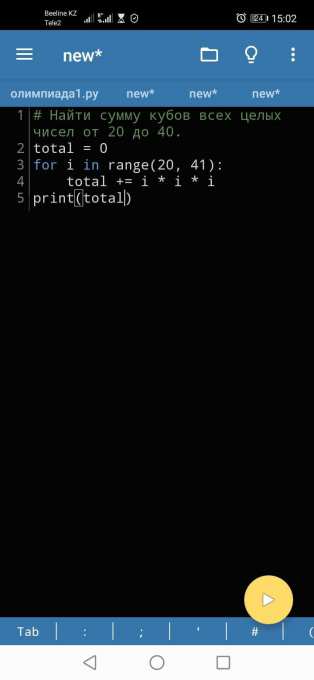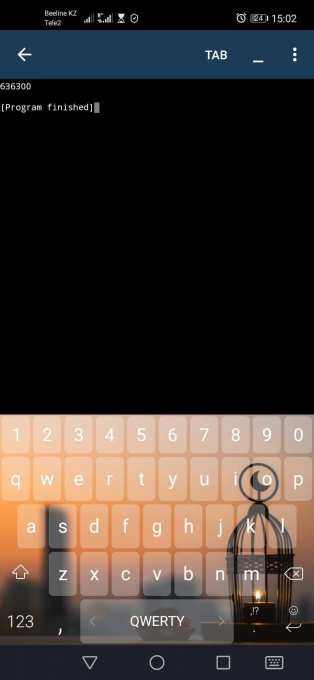|
0 / 0 / 0 Регистрация: 29.04.2016 Сообщений: 8 |
|
|
1 |
|
Найти сумму кубов всех целых чисел в заданном диапазоне04.05.2016, 19:29. Показов 10408. Ответов 1
Найти:1) сумму кубов всех целых чисел от 1 до п (значение п вводится с клавиатуры; 1 < п < 100); 2) сумму кубов всех целых чисел от а до b (значения а иЬ вводятся с клавиатуры; b > a)
0 |
|
Peoples 1623 / 953 / 782 Регистрация: 06.02.2016 Сообщений: 2,449 Записей в блоге: 30 |
||||||||
|
04.05.2016, 19:41 |
2 |
|||||||
|
Решение1.
Добавлено через 1 минуту
1 |
|
IT_Exp Эксперт 87844 / 49110 / 22898 Регистрация: 17.06.2006 Сообщений: 92,604 |
04.05.2016, 19:41 |
|
2 |
var i,S,a,b :integer;
allok :boolean;
begin
write('vvedite a: ');
readLn(a);
repeat
write('vvedite b(b>a): ');
readLn(b);
if b<a then writeLn('b doljno bit menshe 4em a!')
else allok:=true;
until allok;
S:=0;
For i:=a to b do
S:=i*i*i+S;
writeLn('summa kubov ravna: ',S);
readLn;
end.
program zz1;
var n, i, m, s:integer; / / задаем переменные целого типа
begin
write (‘ введите заданное число n ‘); / / вводим с клавиатуры последнее число ряда
read (n);
for i:=1 to n do / / организуем цикл, в котором переберем числа от единицы до n
begin
s:=s + i * i * i; / / возводим очередное число в куб, умножив на себя два раза, и добавляем его в сумму
end;
write (‘ сумма кубов всех целых чисел от 1 до n = ‘, s); / / выводим ответ
end.
Python being the language of magicians can be used to perform many tedious and repetitive tasks in a easy and concise manner and having the knowledge to utilize this tool to the fullest is always useful. One such small application can be finding sum of cubes of list in just one line. Let’s discuss certain ways in which this can be performed.
Method #1 : Using reduce() + lambda The power of lambda functions to perform lengthy tasks in just one line, allows it combined with reduce which is used to accumulate the subproblem, to perform this task as well. Works with only Python 2.
Python
test_list = [3, 5, 7, 9, 11]
print ("The original list is : " + str(test_list))
res = reduce(lambda i, j: i + j * j*j, [test_list[:1][0]**3]+test_list[1:])
print ("The sum of cubes of list is : " + str(res))
Output
The original list is : [3, 5, 7, 9, 11] The sum of cubes of list is : 2555
Time Complexity: O(n)
Auxiliary Space: O(1)
Method #2 : Using map() + sum() The similar solution can also be obtained using the map function to integrate and sum function to perform the summation of the cube number.
Python3
test_list = [3, 5, 7, 9, 11]
print ("The original list is : " + str(test_list))
res = sum(map(lambda i : i * i * i, test_list))
print ("The sum of cubes of list is : " + str(res))
Output
The original list is : [3, 5, 7, 9, 11] The sum of cubes of list is : 2555
Time complexity: O(n), where n is the length of the input list.
Auxiliary space: O(1), constant extra space is required
Method #3 : Using math.pow() and sum() methods
Python3
test_list = [3, 5, 7, 9, 11]
print ("The original list is : " + str(test_list))
x=[]
for i in test_list:
import math
x.append(math.pow(i,3))
res=int(sum(x))
print ("The sum of cubes of list is : " + str(res))
Output
The original list is : [3, 5, 7, 9, 11] The sum of cubes of list is : 2555
Time Complexity : O(N)
Auxiliary Space : O(N)
Method #4 : Using list comprehension:
Python3
test_list = [3, 5, 7, 9, 11]
print("The original list is :", test_list)
res = sum([num**3 for num in test_list])
print("The sum of cubes of list is :", res)
Output
The original list is : [3, 5, 7, 9, 11] The sum of cubes of list is : 2555
Time Complexity: O(N)
Auxiliary Space: O(1)
Method#5: Using for loop
Python3
def sum_of_cubes(lst):
res = 0
for num in lst:
res += num**3
return res
test_list = [3, 5, 7, 9, 11]
print("The original list is:", test_list)
print("The sum of cubes of list is:", sum_of_cubes(test_list))
Output
The original list is: [3, 5, 7, 9, 11] The sum of cubes of list is: 2555
Time Complexity: O(N)
Auxiliary Space: O(1)
Last Updated :
22 Mar, 2023
Like Article
Save Article

bejk
+10
Решено
2 года назад
Информатика
5 — 9 классы
Найти сумму кубов всех целых чисел от 20 до 40. Составьте:
a) Блок схему – 3 балла
b) Псевдокод – 3 балла
c) Программу на Питоне – 3 балла
Смотреть ответ
Ответ
5
(1 оценка)
1
1nkar1
2 года назад
Светило науки — 152 ответа — 0 раз оказано помощи
Ответ:
Написала программу на Пайтон. На 5 баллов норм ведь. И да, за один раз нельзя задавать больше трех вопросов. Такова правила сайта.
Объяснение:


(1 оценка)
Остались вопросы?
Новые вопросы по предмету Информатика
Какое максимальное десятичное число можно представить с помощью 7 двоичных разрядов?
Задание 1 (50 баллов).Решите задачу с помощью таблицы. Задание выполните письменно на бланке домашнего задания или в тетради. Под таблицей запи …
Постройте граф классификации в русском языке по следующему описанию.Предложения в русском языке классифицируются по составу, по интонации и по …
. Постройте граф классификации биологической системы по следующему описанию.Согласно биологической классификации, выделяют три империи (надцарс …
Постройте граф, отображающий состав и структуру мотопехотного батальона по следующему описанию.Во главе батальона БМП стоял командир, которому …


 Спасибо большое заранее.
Спасибо большое заранее. Сообщение было отмечено Kirill1160 как решение
Сообщение было отмечено Kirill1160 как решение
